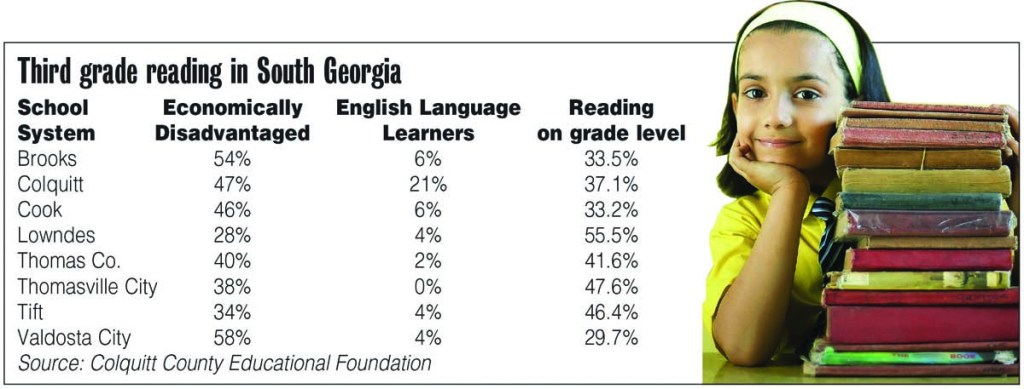New mentoring program to focus on childhood reading
Published 5:52 pm Thursday, October 29, 2020

- Third grade reading
Editor’s note: This article has been changed from its original version to clarify the job description of board member Kristoff Cohran.
MOULTRIE, Ga. — Let’s start with a number: 37.3%.
That’s the percentage of Colquitt County students who are reading on grade level at the end of third grade, according to the Georgia Milestones 2018-2019 Report.
Or, to flip that number around: 62.7% of third graders are not.
Tim Powers, chairman of the Moultrie-Colquitt County Chamber of Commerce Board of Directors, has made it his mission to improve those numbers.
“The critical thing about third grade,” Powers said, “kindergarten through third grade, the emphasis of school is learning to read.”
He described it as kindergarteners through third graders learning to read while students from fourth grade on are reading to learn. He said 85% of curriculum after third grade is learned through reading.
Poor reading skills limit comprehension and skill development from then on, which in turn limits how a student performs on the SAT or ACT to get into college, which college or technical school they can get into and how well they’ll do there. Similarly for the military, poor reading skills hurt the student’s performance on the ASVAB test, which limits which military operational specialties they’re eligible for.
Powers cited a Yale University study that said 75% of students who aren’t reading at grade level by the end of third grade will never catch up.
“At 9 years old, your fate as far as choices of career is pretty much sealed,” he said.
Powers and others in the community are creating a mentoring program designed specifically to help students in kindergarten through third grade learn to read better. Its board of directors was seated at an inaugural meeting Oct. 8, and committees were formed dedicated to staffing and structure, finances, and marketing and communication.
It’s taken the name Colquitt County Educational Foundation.
The board consists of recognizable names: Powers, the chairman, is Moultrie market president of Ameris Bank; Vice Chair Elvira Gibson is the City of Moultrie’s utilities director; Secretary Kristoff Cohran is the psychiatry residency administrator at Colquitt Regional Medical Center and also runs a mentoring program for high school and college students; and Treasurer Barbara Grogan is president of the Moultrie-Colquitt County Development Authority. Other members include Mary Beth Watson, a Colquitt County Board of Education member; Mo Yearta, a former assistant school superintendent and chairman of the Colquitt Regional Hospital Authority; attorney Hayden Willis, chairman of the local Republican Party; martial arts instructor and businessman Kevin Bautista; Brooks Sheldon, one of the founders of Ameris Bank and former member of the Hospital Authority; businessman Dan Jeter, a member of the Development Authority; businessman Richie Turner; and Bertha Riojas of the UGA Extension Service.
Powers said many individuals and groups have provided financial support already, and fund-raising will continue to be a focus going forward.
“Every person I’ve turned to and asked for support has been willing to help,” he said. “It’s been overwhelming and humbling how the community has gotten behind this.”
The foundation is about two months into a 7-to-9-month process of becoming a 501(c)(3) nonprofit, which would make donations to it tax-deductible. Until that process is complete, the United Way of Colquitt County, which is already a tax-deductible nonprofit, is accepting donations for the foundation, Powers said. Contact Powers at (229) 985-0083 or tim.powers@amerisbank.com if you’re interested in donating.
Parallel to that, the foundation intends to hire a mentoring director to coordinate with the school system, manage volunteers, conduct background checks and schedule mentoring sessions.
Powers said he has 60 people committed to be volunteers, but it will probably be next school year before they start working with students. The board wants to get the director in place first, plus the coronavirus pandemic is limiting the ability to meet with students face-to-face.
Powers is confident the mentoring plan will work because it’s worked elsewhere, but students here face some deep-seated challenges: generational poverty, language barriers, and stress and anxiety.
“My pointing it out is not to be critical of our school system,” he said. “I don’t think the problem is theirs.”
Georgia Milestones reports 49% of Colquitt County students are “economically disadvantaged.” Powers said a 3-year-old from an impoverished household has heard 34 million fewer words than a 3-year-old whose parent has a professional degree.
“They [the schools] have children walking into kindergarten two years behind linguistically,” he said. “How do they make that up?”
Children in poverty also don’t have the opportunities to visit the library, a zoo or the Arts Center, he said, missing out on learning experiences that more affluent parents can offer their children.
Meanwhile, 21% of Colquitt County students need additional instruction on the interpretation and use of the English language, Georgia Milestones said.
That’s primarily a function of the large number of Latino families in the county, Powers said, but some native speakers also struggle with the language.
Finally, the current generation faced stress and anxiety unlike any of their forebears even before the coronavirus, Powers said.
“The average child today exhibits the same level of anxiety as the average psychiatric patient in the 1950s,” he said, quoting a passage in Max Lucado’s book “Less Fret, More Faith,” which was published in 2017.
But Powers knows mentoring works because it worked in Bibb County:
• In 2015, 38% of Bibb County’s third grade students were reading at grade level, he said; that’s almost identical to where Colquitt County is now.
• Three hundred mentors, working in 12 Bibb County elementary schools, used United Way’s Read United program with students in kindergarten through third grade, the same age group targeted by the Colquitt County Educational Foundation.
• In 2019, 59.6% of Bibb County third graders were reading at or above grade level. That year is important because the kindergartners of 2015 were the third graders of 2019; they were the first class to go all four years in the program.
“In the 2018-19 school year, 89% of third grade students who participated in Read United passed the standardized Georgia Milestones learning assessment test on their initial attempt,” according to a Macon Telegraph story cited in a Colquitt County Educational Foundation flyer.
The long-term benefit will be not only to the student but to the community, Powers said, explaining the strong support the foundation has received from the Chamber of Commerce and the Development Authority.
Two of the challenges the community faces are no high-paying jobs to bring local students home after college and difficulty attracting high-paying industries because the community can’t provide a highly educated workforce, he said.
Improved literacy among third graders translates to a better educated workforce as they become adults, which translates into more economic development for the community.





